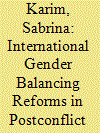|
|
|
Sort Order |
|
|
|
Items / Page
|
|
|
|
|
|
|
| Srl | Item |
| 1 |
ID:
143794


|
|
|
|
|
| Summary/Abstract |
Increasingly UN peacekeeping missions are helping to implement security sector reforms (SSR), including gender reforms, targeted at the local police of host countries. This study uses the UN Mission in Liberia (UNMIL) and the Liberian National Police (LNP) as a way to explore whether SSR may have helped improve individual officers' professional and gender competencies. Conducting a novel lab-in-the-field experiment, we test the individual competencies of 612 LNP officers, also analysing possible determinants of these competencies. We find that most officers have knowledge about statutory crimes and evidence gathering, most officers participate in group activities, almost half are aware of gendered crimes and that male and female officers are equally competent. However, our results suggest that the reforms are at the nascent stages of working, and that more focus should be put into basic training and gender mainstreaming in the Liberian National Police, especially as new recruits are added.
|
|
|
|
|
|
|
|
|
|
|
|
|
|
|
|
| 2 |
ID:
168516


|
|
|
|
|
| Summary/Abstract |
How to restore citizens’ trust and cooperation with the police in the wake of civil war? We report results from an experimental evaluation of the Liberian National Police’s (LNP) “Confidence Patrols” program, which deployed teams of newly retrained, better-equipped police officers on recurring patrols to rural communities across three Liberian counties over a period of 14 months. We find that the program increased knowledge of the police and Liberian law, enhanced security of property rights, and reduced the incidence of some types of crime, notably simple assault and domestic violence. The program did not, however, improve trust in the police, courts, or government more generally. We also observe higher rates of crime reporting in treatment communities, concentrated almost entirely among those who were disadvantaged under prevailing customary mechanisms of dispute resolution. We consider implications of these findings for post-conflict policing in Liberia and weak and war-torn states more generally.
|
|
|
|
|
|
|
|
|
|
|
|
|
|
|
|
| 3 |
ID:
161433


|
|
|
|
|
| Summary/Abstract |
In the aftermath of civil conflict, war-torn states often require reform of their government institutions. Gender balancing, or the inclusion of more women in security-sector institutions, is an increasingly common reform incorporated into state-building processes. Our theoretical priors suggest that gender balancing may influence unit cohesion, operational effectiveness with respect to sexual and gender-based violence, and organizational gender norms. We study these propositions using laboratory experiments with police officers of the Liberian National Police (LNP). We randomly assigned the proportions of women and men in 102 groups of six LNP officers to observe their deliberative processes and group choices. In our experiment, adding more women increased unit cohesion, but we find no evidence to suggest that simply adding more women would increase group (or individual) sensitivity to sexual and gender-based violence. We also find that, despite an increase in participation and influence by women, male beliefs about women's role in policing do not improve with the inclusion of women. As one of the first experimental studies to assess the effects of gender composition within the actual population of interest, our results shed light on how international interventions to address gender equality in postconflict countries affect important outcomes related to security.
|
|
|
|
|
|
|
|
|
|
|
|
|
|
|
|
|
|
|
|
|